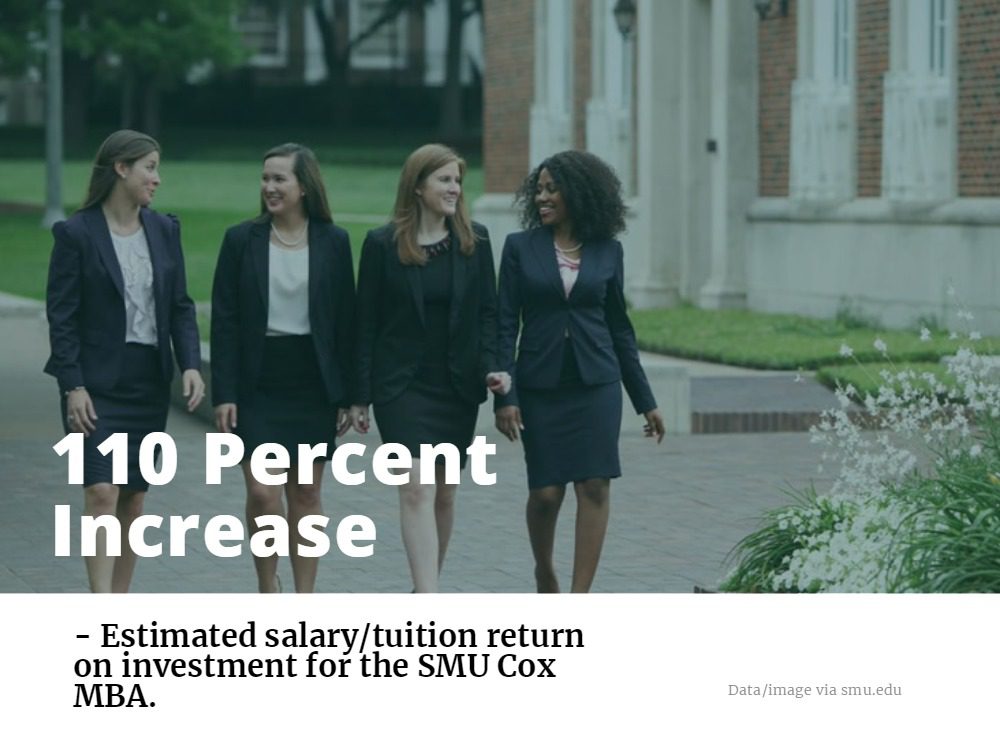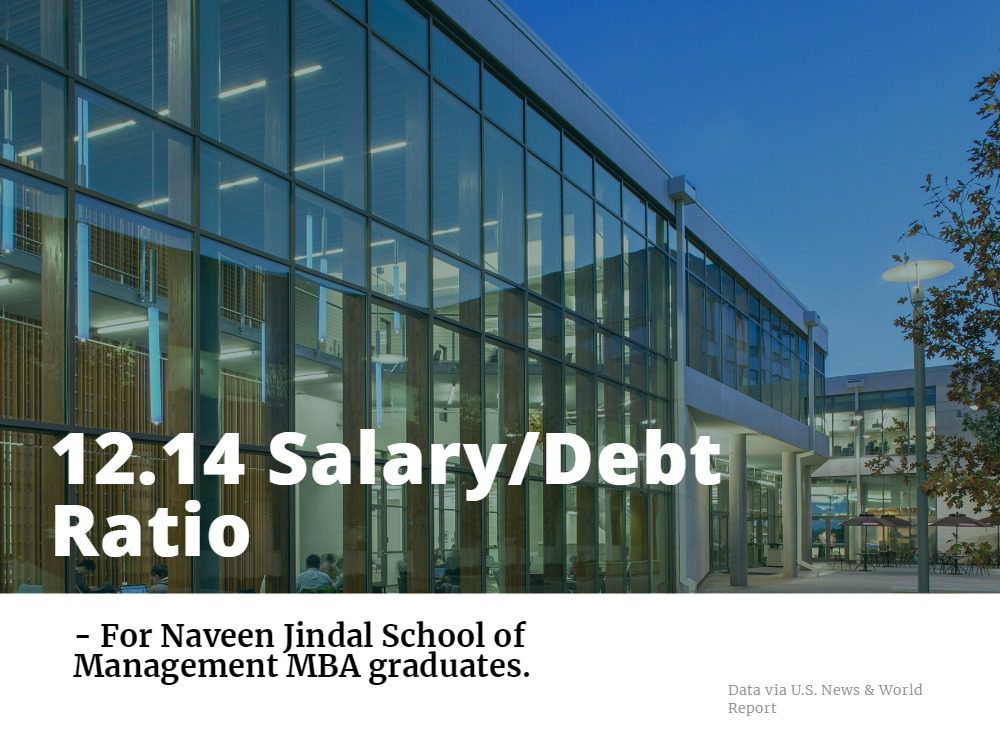Finding the Best Return On Investment for Your MBA: Dallas

Choosing the right MBA program can feel overwhelming. With nearly 800 accredited business schools in the United States, the idea of wading through the information on every program is intimidating to say the least. A variety of features, such as a school rankings, internship opportunities, and an extensive alumni network may be huge factors where you choose to earn your master’s. But one of the most important variables to consider is a program’s return on investment (ROI). It is essential to pick a school with an enviable ROI, as this will ensure that the time and money you dedicate to earning your MBA are not for naught. Given the considerable cost of higher education, it is important to attend the school that will give you the most bang for your buck.
The Best Dallas MBA Return on Investment
Cox School of Business – Southern Methodist University
At the SMU Cox School of Business, students can expect an admirable rate of return on the cost of education. The tuition rate of $45,976 per year for the two-year program is among the most enviable in the U.S. The average graduating salary for MBA’s was $96,587, which is more than double the yearly cost of tuition. This school is also ideal for students hoping to global perspective, as students at Cox have the opportunity to participate in an international MBA exchange program, which allows them to continue their education in Latin America, Europe, Australia, or Asia. Simply put, SMU Cox doesn’t just provide one of the best Dallas MBA return on investment opportunities, but one of the best in the country overall.

Hankamer School of Business – Baylor University
Baylor’s Hanker School of Business is another excellent option for students seeking a respectable ROI. The full-time program can span from 16 to 21 months, with a tuition of $20,597 per semester (over about three to four semesters, depending on course load and core requirements met during undergrad). According to Hankamer’s website, the average starting salary for MBA graduates in 2017 was $73,314. Additionally, Hankamer’s Career Management team is nationally-ranked, and can provide extra support for students seeking help with job placement.
McCombs School of Business – University of Texas at Austin
The MBA program at the McCombs School of Business currently costs $30,750 per semester, bringing the total tuition to about $123,000. The cost will is steeper for non-residents (closer to $189,000). Though the cost of tuition at McCombs is nothing to sneer at, neither is the reward. In fact, the most recent MBA class had an impressive average starting salary of $117,068. McCombs, which is also one of the largest business schools on this list, also has an extensive alumni network, which includes the CEOs of Southwest Airlines (Gary C. Kelly) and Heinz (William R. Johnson).
Naveen Jindal School of Management – University of Texas at Dallas
Like many of the schools we mentioned on this list, the Naveen Jindal School of Management has a solid track record when it comes to ROI. Tuition for the full-time MBA program is just $32,998 for in-state residents and $64,332 for non-residents. In addition to the reasonable cost, the school’s website states that 80 percent of students receive scholarships that cover an average of 45 percent of the total program cost. In 2017, U.S. News & World Report stated that the school’s MBA program, “… had the highest salary-to-debt ratio among ranked business schools.” According to the article, average starting salary for graduates (of those who were employed within three months of graduation) was $86,644.

Neeley School of Business – Texas Christian University
At TCU’s Neeley School of Business, the average starting salary for the most recent graduates of the full-time MBA program was $93,093, surpassing the total tuition of $88,020. Moreover, Neeley boasts a 92 percent employment rate 90 days after graduation. Recent graduates have taken jobs at renowned companies like Ernst & Young and IBM. In addition to standard core classes, Neeley introduces a great deal of experiential learning into the curriculum. At the end of their first year, students participate in an Integrative Project that offers them the opportunity to apply their skills to real-world business obstacles via a week-long simulation.
Which Dallas MBA Programs Offer the Best Starting Salary?

It’s naive to think that folks who earn their MBA degree don’t expect to earn a decent salary. After years of balancing work, studying, and life, an MBAs starting salary is the cherry on top of the grad school sundae. For those looking to work in or are attending school in the Dallas metro, here are the programs that can help you find that well-deserved pay day the fastest.
High Rollers
McCombs School of Business – University of Texas at Austin
According to statistics provided by the McCombs School of Business school, the average full-time MBA student goes on to earn a starting salary of $113,481 following graduation. The average full-time MBA grad also receives a signing bonus of $27,564. A full breakdown of McCombs full-time MBA salary statistics can be found here.
The McCombs School of Business is usually ranked among business schools in the U.S. for the number of MBA graduates who earn job offers. In fact, career planning is also built into the curriculum of the full-time MBA. During the first year students take a class called Strategic Career Planning—a course that was created to best prepare students to make career choices and help them achieve their career goals. The class teaches students skills like interview training and marketing and networking techniques.
Cox School of Business – Southern Methodist University
According to SMU’s MBA Placement Data, graduating MBAs at the Cox School of Business earn an average salary of $96,587. Recent Cox MBAs have been offered jobs at companies such as Amazon, At&T, Capital One, Deloitte, and more.
Students have the option of customizing their education by completing up to two concentrations in addition to the MBA program. While all full-time students are enrolled in the General Business concentration, additional majors include: accounting, business analytics, finance, general business, information technology and operations management, management, marketing, real estate, and strategy and entrepreneurship. MBAs majoring in strategy, general management, leadership, and consulting earn a bit more, averaging $108,333 to start, while accounting, finance, and real estate majors earn a bit less, averaging $94,173 annually.
Next Tier
Neeley School of Business – Texas Christian University
The TCU Neeley School of Business full-time MBA program is designed for professionals who may not necessarily have a background in business, but are interested in changing careers or transitioning into a new field where business and management knowledge would be necessary. According to StartClass, TCU MBAs earn an average salary of $89,579 post-graduation.
To help secure a job with a well-paying salary, MBA students have access to The Neeley Professional Development Center and the Graduate Career Services Center. The Professional Development Center provides Neeley students with personal and professional training and coaching for presentations, business writing, and career preparation. Meanwhile, the Graduate Career Services Center provides students with resume help, job search, networking events, career coaching, interview prep, and skill building programs.
CHECK THIS OUT: “The Most Affordable MBA Programs in Dallas“
Commerce College of Business – Texas A&M University
Different from the Mays School of Business on A&M’s main campus, the Commerce College of Business is located about one hour northeast of the Dallas metro. PayScale data reveals that Texas A&M Commerce MBAs earn a starting salary of $89,393.
Commerce students have access to the office of Career Development, which offers students special events such as networking nights, job shadow programs, business etiquette dinners, career fairs, and job search workshops. The CD can also help students with resume and cover letter consultation, LinkedIn consultation, mock interviews, career assessment, and counseling and employment application
Naveen Jindal School of Management – University of Texas at Dallas
Students who graduate with an MBA degree from the Jindal School of Management at UT Dallas earn an average starting salary of $86,644.
According to U.S. News, MBA graduates from the Naveen Jindal School of Management have the best salary-to-debt ratio of any ranked school. As stated above, Jindal MBAs earn an average starting salary of $86,644 and have an average student loan debt of $7,132—an earnings-to-debt ratio of 12.148. The average ratio for ranked business schools that reported the data is 1.986.
Up-And-Coming
Hankamer School of Business – Baylor University
Baylor Hankamer School of Business MBA graduates earn a reported average starting salary of nearly $65,000. Recent Baylor full-time MBA graduating class had a 64 percent job placement rate at the time of graduation and 86 percent placement rate 90 days after graduation.
University of North Texas College of Business
PayScale reports that the average starting salary for North Texas College of Business MBA grads is also $65,000. North Texas features the Career Center at the Business Leadership Building where students receive one-on-one advising, career planning, and career exploration help from graduate advisors. These advisors help students with résumé and cover letter writing as well as mock interviews.
Hankamer LAUNCH Program Inspires Entrepreneurs to Help Others

The LAUNCH program at the Baylor University – Hankamer School of Business is giving entrepreneurs an opportunity to take on projects they are passionate about that also leave a positive impact on society.
Baylor MBA Alum Promotes Healthy Lifestyle Through Education

Jana Pickett, a graduate of the Baylor University – Hankamer School of Business, has used her MBA education to turn her passion for fitness into a business.
The Best Dallas Online MBA Programs

It’s hard to argue against business school as a practical solution for staying competitive and getting ahead in the game. But time and money are scarce resources for most — how can you balance work, life and school when you need to spend half the day commuting to a classroom? For those in Texas, a Dallas Online MBA could be the right remedy.
The Top Dallas Marketing MBA Programs

With the recent growth of the “Silicon Prairie” in areas like Dallas, Texas, it’s no wonder that business students are heading south for their business education. With a low cost of living and an ever-increasing number of job opportunities, Dallas may just be a perfect place for such students to get their education and start a career.
And while most MBA degree programs provide a general foundation of business knowledge to launch such a career path, many programs also give students the opportunity to specialize within a particular field. With such tailored learning, whether in the form of a specialized MBA or MBA concentration, such graduates will have a competitive edge in the job market.
Students looking to enter the marketing field in the Dallas metro area have a number of opportunities to earn their MBA degree in the area while still focusing more specifically on their marketing education.
The Top Dallas Marketing MBA Programs
Cox School of Business – Southern Methodist University
At the SMU Cox School of Business, students have the opportunity to concentrate their MBA degree in a particular field. Selecting a concentration can better help students prepare for their future career path and demonstrate a more specialized experience for graduates entering the work force.
Marketing is among the available concentrations for students at Cox, which requires just 16 credit hours. Some classes available to fulfill the requirement include, among others:
- Customer Insights and Market Intelligence
- New Product Development
- Understanding What Customers Value
- Consumer Behavior
Commerce College of Business – Texas A&M University
Student at the Cox College of Business are able to select a minor for the MBA degree by concentrating all of their elective courses within a particular field. While the rest of the course requirements for a Commerce MBA consist of generalized business courses, students can take four marketing courses as part of their elective credits to create a marketing minor. Possible classes for a marketing minor include:
- Small Business Brand Management
- Business-to-Business Marketing
- Internet Marketing
Hankamer School of Business – Baylor University
Students at the Hankamer School of Business may add a concentrate their MBA degree by devoting nine elective hours to their chosen field, such as marketing. Typically, a full-time MBA at Hankamer consists of 12 credit hours of business foundation courses, 35 credit hours of core classes, 15 credit hours of electives (nine of which would need to be focused within marketing to constitute a concentration) and three credit hours for an internship.
McCombs School of Business – University of Texas at Austin
The McCombs School of Business at UT Austin espouses that an education in marketing can be crucial in preparing students for a number of careers in management and entrepreneurship. Students at McCombs may choose to pursue a Marketing specific MBA degree, with courses offered through the marketing department and tailored specifically to graduate marketing students. Such class offerings include, among many others:
- Marketing & Customer Insights Practicum
- Creativity & Leadership
- Integrated Marketing Communications
- Business and the Environment
Naveen Jindal School of Management – University of Texas at Dallas
At the Jindal School, students are encouraged to concentrate their MBA degree in a specific business area or specialization. In order to select one of the many concentration offerings at Jindal, students must simply take a cluster of 12 semester credit hours within their particular area of study.
In a marketing MBA concentration at Jindal, students “learn how to understand customers’ needs and purchase behaviors, how to satisfy those needs and how to make a profit in competitive industries and markets.” Within the concentration, students will learn how to develop strategy, manage various brands, conduct research and much more.
Neeley School of Business – Texas Christian University
Students in the full-time Accelerated MBA at Neeley have the chance to focus their electives in a particular area of study, such as marketing. And with the accelerated degree plan- a program developed for each individual student based on their past academic and professional experience — students can have an MBA degree in hand within just twelve months.
University of North Texas College of Business
The University of North Texas’ Department of Marketing and Logistics offers programs which give students the chance to specialize their MBA degree within the marketing field. With the combined general business knowledge of an MBA and specialized marketing education, graduates from the program can open the door to a number of career opportunities and move quickly into managerial roles.
MBAs concentrating in Marketing at UNT have a number of background and core courses that must be taken as part of the general MBA program. The six hours of required marketing courses consist of: Advanced Marketing Research and Analytics and Effective MKTG Planning in Dynamic Environments, as well as nine hours of supporting courses and three hours of an elective outside of marketing.
University of Texas at Arlington College of Business
The MBA Flexible program at at UT Arlington offers students the chance to concentrate their degree in marketing. The program helps students to appreciate the key role marketing plays in the overall strategy of an organization by providing a deeper understanding behind product strategy and staying up-to-date with trends, along with many other key aspects of marketing.
Students looking to concentrate their Flex MBA in marketing must complete at least three upper-level graduate marketing courses in addition to the required course, MARK 5311.
